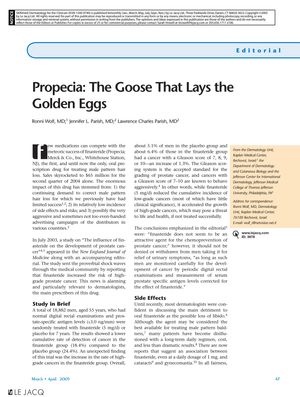TLDR Finasteride is popular for treating male hair loss but may increase the risk of serious prostate cancer and has other potential side effects.
The document discusses the success and concerns associated with finasteride (Propecia), an oral medication for male pattern hair loss. Sales of finasteride reached $65 million in the second quarter of 2004, reflecting its high demand due to limited previous success in treating male pattern hair loss, its low side effects, and aggressive advertising. However, a study involving 18,882 men aged 55 years or older, which was published in the New England Journal of Medicine in July 2003, found that while finasteride reduced the incidence of low-grade prostate cancers, it increased the rate of high-grade cancers by 1.3%. This raised concerns about the drug's safety, particularly at a daily dose of 5 mg. The document also mentions other potential side effects such as loss of libido, cataracts, and gynecomastia. The authors suggest that dermatologists prescribing finasteride for androgenetic alopecia should now discuss these new findings with patients, monitor them appropriately, and possibly refer them for routine urologic evaluations. The enthusiasm for prescribing finasteride must be balanced with the potential risks associated with its long-term use.
 3 citations
,
June 2004 in “Annales De Dermatologie Et De Venereologie”
3 citations
,
June 2004 in “Annales De Dermatologie Et De Venereologie” Four new cases of gynecomastia (male breast enlargement) linked to finasteride (Propecia) have been found.
 6 citations
,
April 2004 in “Dermatologic Surgery”
6 citations
,
April 2004 in “Dermatologic Surgery” Finasteride showed limited hair growth and low patient compliance in treating male pattern baldness.
 11 citations
,
February 2004 in “Clinical and Experimental Ophthalmology”
11 citations
,
February 2004 in “Clinical and Experimental Ophthalmology” Taking Propecia might lead to the development of cataracts.
 71 citations
,
January 2004 in “Dermatology”
71 citations
,
January 2004 in “Dermatology” Oral finasteride works better than topical minoxidil for hair growth, both are safe.
 222 citations
,
October 1993 in “Journal of The American Academy of Dermatology”
222 citations
,
October 1993 in “Journal of The American Academy of Dermatology” Hair loss affects women's mental health more than men's, causing anxiety, low self-esteem, and social insecurity.
 9 citations
,
September 2010 in “Dermatologic Therapy”
9 citations
,
September 2010 in “Dermatologic Therapy” Finasteride for hair loss is safe and does not increase the risk of high-grade prostate cancer.
 74 citations
,
April 2005 in “Dermatologic Clinics”
74 citations
,
April 2005 in “Dermatologic Clinics” Minoxidil and finasteride are effective for male hair loss, minoxidil for female hair loss, and various treatments like corticosteroids work for alopecia areata; treatment should be tailored to the individual.
 3 citations
,
January 2001 in “Cambridge University Press eBooks”
3 citations
,
January 2001 in “Cambridge University Press eBooks” Finasteride effectively treats hair loss and enlarged prostate in men, with mild side effects.
 July 1997 in “Journal of Cutaneous Medicine and Surgery”
July 1997 in “Journal of Cutaneous Medicine and Surgery” Finasteride significantly increases scalp hair and prevents hair loss in young and middle-aged men.
 89 citations
,
December 2006 in “Lancet Oncology”
89 citations
,
December 2006 in “Lancet Oncology” Taking 1 mg/day finasteride for hair loss significantly lowers PSA levels in men, which may affect prostate cancer screening.










